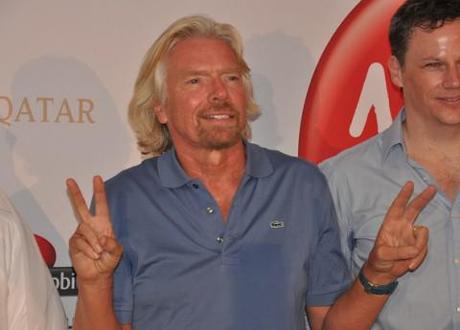
Sir Richard Branson: Legalise drugs, man. Photocredit: D@LY3D http://www.flickr.com/photos/daly3d/4603352127/sizes/z/in/photostream/
Virgin tycoon Sir Richard Branson has called for a softer approach to drug abuse. Speaking to a Home Affairs Select Committee, he said that the government should see it as a “health problem” rather than a “criminal problem.” He spoke in his role as a commissioner for the Global Commission on Drug Policy. The comments come as judges have been given new sentencing guidelines, with low-level dealers spared jail. Those who buy drugs to share with friends (without profiting), and drug mules, can also expect lower sentences, reported the BBC.
Branson used the example of Portugal, which decriminalised drugs ten years ago, reducing the amount of drug abuse by 50 per cent, and allowing more focus on catching criminals supplying drugs. He also advocated greater regulation of the drugs trade, which would mean that young people knew what they were taking. He said that were he to find an employee taking drugs, he wouldn’t sack them, but would help them. He’s won many supporters, including Dame Judi Dench, said Channel 4 News.
The battle lines are being drawn: is criminalising drugs playing into the hands of criminals the worlds over? Would decriminalisation lead to lower usage? The Daily Mail, naturally, was not happy, citing the example of a 17 year old boy who had died falling down the stairs whilst high on skunk, thereby, in the paper’s view, proving Sir Richard wrong.
“I would not advocate heroin and cocaine to be sold in supermarkets,” said Sir Richard Branson, quoted on the BBC.
Branson’s right. A letter to The Daily Telegraph from an ex-psychiatric hospital worker said that “the only way to beat the drug problem is to decriminalise it.” Drugs that are addictive “should be given through GP prescription”, which would allow easier identification of users, and help “avoid contaminated drugs.” It would also “reduce the availability of drugs on the street”, with a knock-on effect of reducing crime and refocusing police attention on criminal gangs. “When is a political leader going to be brave enough to grasp this nettle?”
No he’s not. However, another letter on the same paper said that Branson’s comments about Portugal rely on a flawed report. Prevention is the only way, engaging “with all sections of society.” It’s worked “with tobacco smoking”, and can only happen through “enforcement.”
His logic’s flawed. Michael Deacon, The Telegraph’s sketch writer, said that Branson’s logic was that “because governments have failed to prevent people committing a particular crime, it should no longer be classified as a crime at all.” It was “fascinating to see him acting serious”, and he “looked like a middle-aged lion squinting into a sandstorm.”
At least sentencing guidelines are a step in the right direction. Leo Benedictus in The Guardian said that he needed a “whooplet” to celebrate the softening of sentencing for some drug offences. A whooplet, because it’s “the smallest unit of celebration.” Jailing people for buying 20 ecstasy pills and sharing them with a friend is “an act of stupidity.” Pills do “nothing more harmful than inflict some loss of sleep.” People don’t “commit crimes because they’re on drugs – they commit them because they want money to buy drugs.” It’s time to decriminalise – especially in the case of “people being locked up for the crime of seeking mostly harmless fun.”
We need total legalisation. Danny Kushlick in The Daily Mirror said that the illicit drug trade turned over £320 billion a year globally, and £6 billion a year in the UK. Enforcing prohibition “inflates prices”, and makes some addicts thieve to support their habits. If people were able to get their drugs from a doctor, it might mean a hell of a difference to their lives. 100,000 die every year because of smoking; 40,000 because of drink. The government doesn’t mind people killing themselves because of that. There is so much stress on prisons because of drug-related crime, meaning that the cost of the “war on drugs” is thought to be about £20 billion. There’s a “clear choice” – let drugs stay under the control of criminals – or let them be “controlled by the government.” Legalise the Taliban out of the equation, and let drugs become “another vegetable to be traded – like tea or tobacco.”
But is everyone missing the point? It’s possible. Channel 4 News said that drugs policy has been a “hot topic” ever since the first international treaty was signed, 100 years ago. Whilst the government’s official drugs advisors (the Advisory Council on the Misuse of Drugs) have called for decriminalisation, the Home Office itself has said it has “no intention of liberalising.” The news website then said that the debate might be missing the point, quoting Martin Barnes, the chief executive of DrugScope, who said that actually there had been “a gradual decline in overall reported levels” of drug use. It’s government spending cuts that are really the issue – which might set the UK back “at least a decade” in its fight against abuse.

